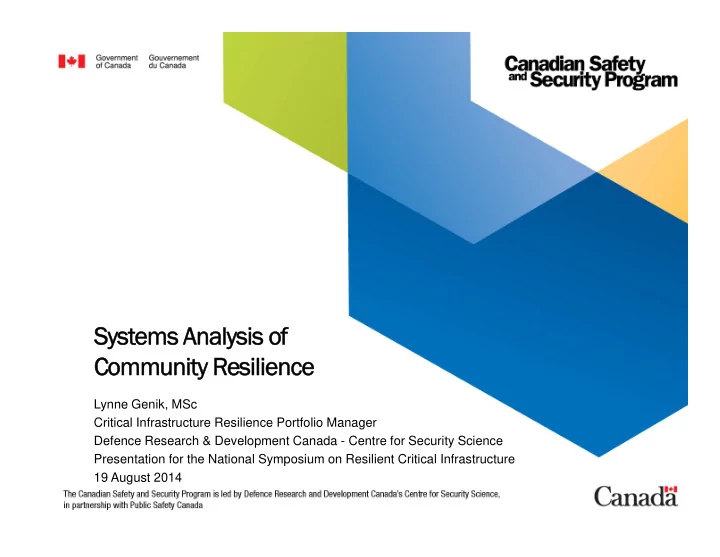

Syst Systems Analysis of ems Analysis of Community R Community Resilience silience Lynne Genik, MSc Critical Infrastructure Resilience Portfolio Manager Defence Research & Development Canada - Centre for Security Science Presentation for the National Symposium on Resilient Critical Infrastructure 19 August 2014
What’s the Pr What’s the Problem? oblem? • Heavy and increasing reliance on interdependent systems • Systems becoming more complex • Privatization of many critical services • Drive for efficiency has removed layers of resilience • Incidents expose planning and capability deficiencies 1
Pr Project Purpose & Objectiv oject Purpose & Objectives es Purpose: • Evaluate utility of Architectural Frameworks (AF) and Soft Systems Methodologies (SSM) in examining community as “resiliency system” Objectives: • Understand hazards, resources, steps to help community mitigate/prevent, prepare for, respond to, recover from incidents • Identify specific lessons to community and general points for elsewhere 2
Pember mberton V n Valle lley y 3
Resiliency Syst siliency System em Set of plans, capabilities and resources strengthening a community’s ability to withstand disruptive influences and enabling it to recover from crisis events 4
Ar Archit chitecture ecture Frame amewor orks (AF) ks (AF) “Who, what, how…?” 5
6 Systems Methodology (SSM) ems Methodology (SSM) Soft Syst Sof
Pr Project Appr oject Approach oach • Pre-visit research (10 CI sectors) • Initial community visit • Workshop sessions • Post workshop analysis and architectural development • Validation sessions and scenario workshop 7
Some Findings Some Findings • Legislation and policy tensions • Misaligned expectations • Private sector engagement challenges 8
Community P Community Perspectiv pectives on R es on Resilience silience • First Nations • Rural community • Village community 9
Essential Ser Essential Services ices • Several essential services require rapid intervention in event of loss • Community considered “unsustainable” in less than 3 weeks with loss of certain essential services • Exacerbated by time of year 10
Planning Planning • Sophisticated EM response structure exists • Provincial risk analysis tool kit stops short of providing framework for response plans • Need for local plans that address consequences of key risk events 11
Utility of Archit Utility of Ar chitecture F ecture Frame amewor orks ks Pros Cons • Sophistication of model • Complexity and skills requirement • Consistent reference • Workload to build and analyse model • Can extract reusable generic model • Cost of tools 12
Utility of Sof Utility of Soft Syst Systems Methodology ems Methodology Pros Cons • Allowed issues to surface • Limitations of workshop analysis approach • Good fit with architecture approach 13
Conclusions Conclusions • Community embraced project outputs; changed behaviour • AF is a concept versus prescribed toolset • SSM approach beneficial to capture perspectives • Further work required 14
Recommend
More recommend